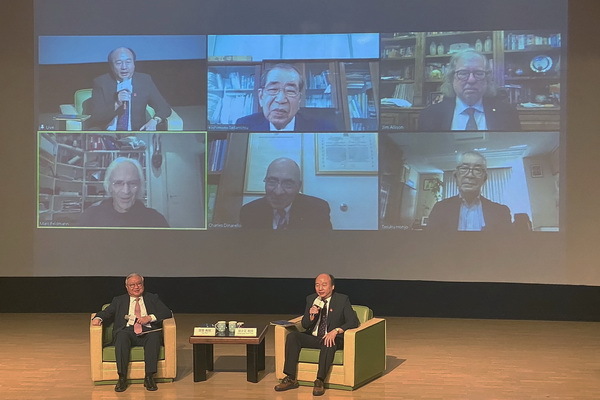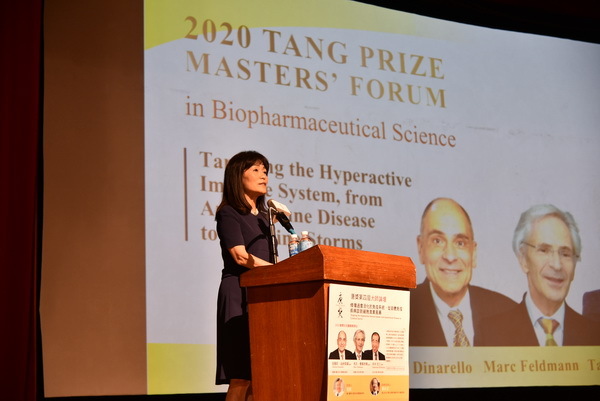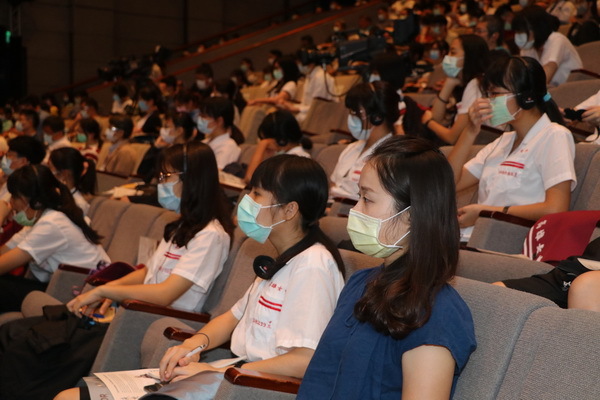Tang Prize forum at NCKU: Laureates discuss inflammatory mechanisms in the COVID-19 era
The Tang Prize Foundation held its 2020 Masters’ Forum in Biopharmaceutical Science at National Cheng Kung University. Via an online conference, the three laureates, Dr. Charles Dinarello, Dr. Marc Feldmann, and Dr. Tadamitsu Kishimoto, talked about their life-long journey in medical research and discussed how the current treatments for inflammatory diseases could help in the COVID-19 pandemic.
The 2020 Tang Prize in Biopharmaceutical Science in June was awarded to the three scientists “for the development of cytokine-targeting biological therapies for treatment of inflammatory diseases.” Their basic research on the human inflammatory response has contributed greatly to the treatment of inflammatory diseases such as rheumatoid arthritis.

Panel discussion about related to inflammatory research was carried out via an online conference.
The inflammatory response is a basic human immune mechanism. When a foreign substance such as a virus or bacterium invades the body, immune cells flood to the site of the invasion and attack the invading substance. This response is triggered by “cytokines,” a type of protein released by body cells under attack.
The Masters’ Forum in Biopharmaceutical Science, titled “Targeting the Hyperactive Immune System, from Autoimmune Disease to Cytokine Storms,” co-hosted by Professor Yun Yen (閻雲) of Taipei Medical University and Professor Shaw-Jeng Sean Tsai (蔡少正) of National Cheng Kung University, took place on September 22nd. Previous 2014 Tang Prize laureates and 2018 Nobel Prize laureates, Dr. James P. Allison and Dr. Tasuku Honjo, were also invited to the discussion.
Right now, in the face of the COVID-19 pandemic, scientists around the globe are looking at several ongoing medical trials to determine if cytokine-targeted biologics, such as the interleukin-1 (IL-1) receptor antagonist anakinra, can help lessen the severity of symptoms and reduce the progression of the disease.
Dr. Huey-Jen Jenny Su (蘇慧貞), President of NCKU, expressed in her welcome remarks that the research of the awardees has led to the development of better treatments for autoimmune diseases and in turn to benefits for mankind. She encouraged the attendees to use scientific research to search, to discover, and to benefit human kind.

Dr. Su recognizes the importance of cytokine-targeted treatments.
When the human body releases cytokines in a great quantity, it puts a strain on the body organs and may in turn damage the body. Excessive immune cells fail to distinguish between foreign substances and normal cells, resulting in their attacking not only the invader but also the patient’s own cells. This overwhelming event is called a “cytokine storm.” Cytokine storms are one of the leading factors that contribute to mortality in diseases because the patients are fighting against both the invading substance and their own bodies.
Scientists have found excessive cytokine release in infections seems to correlate with lung damage, according to Dr. Dinarello. “The cytokine storm keeps raging long after the virus is no longer a threat,” Dr. Dinarello pointed out in his recorded lecture on Tuesday.
From the laureates’ basic research findings, scientists have developed treatments with cytokine inhibitors. By inhibiting the body’s inflammatory responses, these biologics are able to alleviate the symptoms caused by inflammatory diseases.
Professor Shaw-Jeng Sean Tsai stated that cytokines have always been a crucial subject in the field of biopharmaceutical science, and now even more attention has been brought to inflammatory research because of the COVID-19 pandemic.

Attendees are encouraged to apply science to benefit the human kind.
Dr. Charles Dinarello, Distinguished University Professor of the University of Colorado, was the first person to identify IL-1 as a cytokine. IL-1β is a key mediator for fever and inflammatory diseases, as Dr. Dinarello found in his studies, which later helped in the development of therapeutics targeting this cytokine.
Dr. Marc Feldmann, emeritus professor at the University of Oxford, noticed that tumor necrosis factor (TNF) is the main cytokine present in rheumatoid arthritis cases. This finding helped develop an anti-TNF antibody for treatment of rheumatoid arthritis.
Dr. Tadamitsu Kishimoto, former President of Osaka University, discovered that the cytokine interleukin-6 (TL-6) regulates the production of antibodies. His discovery helped in the development of new therapeutics for severe multi-organ chronic diseases. (Writing by Hsu Tsu-yueh)